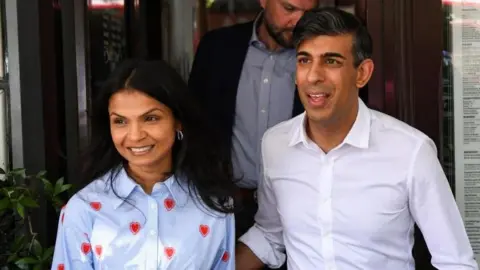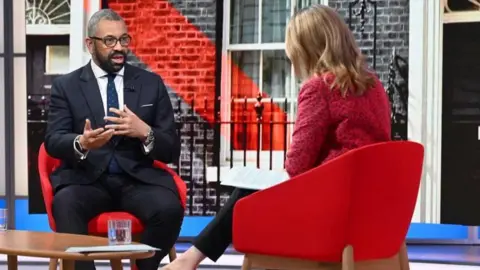 Reuters
ReutersThe Conservatives have set out a plan to require 18-year-olds take part in a form of national service if the party wins the general election on 4 July.
Rishi Sunak said the scheme would promote a “shared sense of purpose among our young people and a renewed sense of pride in our country”.
Labour has labelled the plan a “gimmick” and other parties have criticised the government for its record on cutting troop numbers.
However, there is still much we do not know about how it would work.
Here is the detail we have so far.
What is the national service scheme?
The proposed new scheme would not be conscription, where people are legally required to join the armed forces for a period.
But it would compel people by law to complete a community programme over a 12-month period, or enrol in a year-long military training scheme, when they turn 18.
The name is taken from the mandatory military training British men aged 17-21 had to undertake between 1949 and 1960.
Then, national service meant 18 months of military training and spending four years on a reserve list, meaning they could be called up to fight at short notice.
The scheme being proposed now would not force anyone to do military training, Home Secretary James Cleverly told the BBC.
It would be made up of two broad streams for 18-year-olds to choose from:
- Spending one weekend every month – which equates to 25 days over a 12-month period – volunteering with organisations such as the NHS, fire service, ambulance, search and rescue, and critical local infrastructure
- Military training: Applying for one of up to 30,000 “selective” military placements reserved for teenagers deemed the “brightest and the best” in areas like logistics, cyber security, procurement or civil response operations over a year-long period
The vast majority of 18-year-olds would not take part in any military training at all.
 PA Media
PA MediaWould there be punishments for not taking part?
While 18-year-olds would have a choice in the type of national service they signed up to, participation would not be voluntary – it would be required by law.
No one would go to prison for not taking part, Mr Cleverly said, but there would be non-criminal sanctions for those who refused.
The Conservatives have not said what those punishments would be.
How many people would this plan involve?
As of 2021, there were around 775,000 18-year-olds in the UK, according to data from the Office for National Statistics.
If that number were the same today, it would mean only one in 26 18-year-olds would do a military placement. The vast majority would instead do community volunteering.
It is not clear whether those who complete the military training would become reservists, or be given the option to take part in further training.
We do not know what exemptions would be in place for people with conditions which mean they could not participate.
It is also not known whether people in full-time education or employment would be compelled to take part, or whether they would be able to defer completion.
The Tories have not said whether UK citizens living overseas would be required to return in order to complete national service.
When would the national service scheme start?
Anyone who is almost 18 years old now is unlikely to have to take part.
The Tories have not announced a fully fledged plan. Instead, they have put forward a broad outline and said they would set up a royal commission – a type of public inquiry – tasked with coming up with the details if they win the election.
While they aim to have a military training test programme up and running by 2025, that is likely to involve relatively small numbers.
The Tories have committed to getting the whole scheme in force by “the end of the next parliament”, which could be as late as 2029.
Would people be paid for doing national service?
It is likely there would be some sort of reimbursement for the military stream, given it would be a year long.
But the Conservatives have not confirmed this, or said how much it would be.
In 2019, a report by the Royal United Services Institute think tank pointed out how other European countries with similar schemes – such as Norway and Finland – pay participants expenses or a stipend, though at a rate well below a normal salary.
The report also noted minimum wage laws do not apply to the armed forces but said compensation for a UK scheme would have to be at a level “deemed respectful to the participants”.
Two days after the initial policy announcement, the Tories said possible incentives for people who do the armed forces placements could include “fast tracked interviews” for graduate schemes in the private and public sector.
The party said other incentives might include “highlighting national service on UCAS applications” and the government “encouraging” employers to consider people who have completed the training for jobs.
For the majority of people taking part in community work, it seems unlikely there would be any sort of reimbursement.
All of this would be decided by the inquiry set up after the election.

How would the government pay for the national service scheme?
The Tories estimate the scheme would cost £2.5bn – two fifths of which the party said it would raise by “cracking down on tax evasion and avoidance”.
The rest would come from money being diverted from the UK Shared Prosperity Fund, a pot of money which was set up to make up for financial support community organisations lost when the UK left the European Union.
Previously, this money has been billed as supporting the government’s levelling up agenda.
Mr Cleverly told the BBC that funding was due to end but has been extended by three years, at which point it will be diverted to pay for national service.
He said the money would be spent around the country and the “levelling up impact … will continue”.

